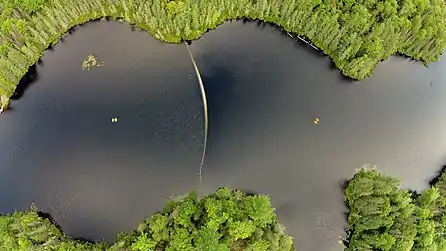Kinwamakwad (Long) Lake
Kinwamakwad Lake, also known as Long Lake, is a seepage lake on Ojibwe lands at the University of Notre Dame Environmental Research Center in Gogebic County, Michigan. The lake has been studied since the mid-1900s and used as an experimental lake for ecological studies.
| Kinwamakwad Lake | |
|---|---|
| |
_.jpg.webp) Kinwamakwad Lake (Long Lake) in the early morning. | |
 Kinwamakwad Lake | |
| Location | Marenisco Township, Michigan, United States |
| Coordinates | 46°14′9.16″N 89°29′56.07″W[1] |
| Type | mesotropic |
| Catchment area | 16.4 ha (41 acres)[2] |
| Surface area | 8.1 ha (20 acres)[2] |
| Average depth | 3.8 m (12 ft)[2] |
| Max. depth | 14 m (46 ft)[2] |
| Water volume | 318,084 m3 (11,233,000 cu ft)[2] |
| Residence time | 2 years |
| Shore length1 | 800 m (2,600 ft) |
| Surface elevation | 514 m (1,686 ft) |
| Frozen | Ice covered typically from November to April[3] |
| 1 Shore length is not a well-defined measure. | |
Description
Kinwamakwad Lake is an hourglass-shaped lake with two deep basins to the East and West and a shallower portion in the middle of the lake. The name "Kinwamakwad" likely comes from the Ojibwe word ginwaakwad, meaning "it is long, is tall".[4][5]
Ecological studies
Kinwamakwad Lake has been studied for several decades and is a part of the Global Lake Ecological Observatory Network.[6] The lake has been used in several whole-lake experiments examining the effects of nutrients and food web structure on lake productivity[7][8] as well as the effects of dissolved organic carbon on lake productivity.[2][9][10]
Records
A pair of the unofficial world's largest secchi disks reside in Kinwamakwad Lake, with both disks measuring 2.44 meters in diameter.[11]

References
- "Kinwamakwad Lake". Geographic Names Information System. United States Geological Survey. April 14, 1980. Retrieved January 9, 2019.
- Zwart, Jacob A.; Craig, Nicola; Kelly, Patrick T.; Sebestyen, Stephen D.; Solomon, Christopher T.; Weidel, Brian C.; Jones, Stuart E. (2016). "Metabolic and physiochemical responses to a whole-lake experimental increase in dissolved organic carbon in a north-temperate lake". Limnology and Oceanography. 61 (2): 723–734. Bibcode:2016LimOc..61..723Z. doi:10.1002/lno.10248. ISSN 1939-5590.
- Hararuk, Oleksandra; Zwart, Jacob A.; Jones, Stuart E.; Prairie, Yves; Solomon, Christopher T. (2018). "Model-Data Fusion to Test Hypothesized Drivers of Lake Carbon Cycling Reveals Importance of Physical Controls". Journal of Geophysical Research: Biogeosciences. 123 (3): 1130–1142. Bibcode:2018JGRG..123.1130H. doi:10.1002/2017JG004084. ISSN 2169-8961.
- Bright, William (2004). Native American Placenames of the United States. University of Oklahoma Press. ISBN 978-0-8061-3598-4.
- "The Ojibwe People's Dictionary". ojibwe.lib.umn.edu. Retrieved 2020-04-14.
- "West Long Lake (Kinwamakwad Lake) | GLEON". gleon.org. Retrieved 2019-01-10.
- Christensen, David L.; Carpenter, Stephen R.; Cottingham, Kathryn L.; Knight, Susan E.; LeBouton, Joseph P.; Schindler, Daniel E.; Voichick, Nicholas; Cole, Jonathan J.; Pace, Michael L. (1996). "Pelagic responses to changes in dissolved organic carbon following division of a seepage lake". Limnology and Oceanography. 41 (3): 553–559. Bibcode:1996LimOc..41..553C. doi:10.4319/lo.1996.41.3.0553. ISSN 1939-5590.
- Carpenter, Stephen R.; Christensen, David L.; Cole, Jonathan J.; Cottingham, Kathryn L.; He, Xi.; Hodgson, James R.; Kitchell, James F.; Knight, Susan E.; Pace, Michael L. (1995-03-01). "Biological Control of Eutrophication in Lakes". Environmental Science & Technology. 29 (3): 784–786. Bibcode:1995EnST...29..784C. doi:10.1021/es00003a028. ISSN 0013-936X.
- Kelly, Patrick T.; Craig, Nicola; Solomon, Christopher T.; Weidel, Brian C.; Zwart, Jacob A.; Jones, Stuart E. (2016). "Experimental whole-lake increase of dissolved organic carbon concentration produces unexpected increase in crustacean zooplankton density". Global Change Biology. 22 (8): 2766–2775. Bibcode:2016GCBio..22.2766K. doi:10.1111/gcb.13260. ISSN 1365-2486. PMID 26919470.
- Koizumi, Shuntaro; Craig, Nicola; Zwart, Jacob A.; Kelly, Patrick T.; Ziegler, Jacob P.; Weidel, Brian C.; Jones, Stuart E.; Solomon, Christopher T. (2018). "Canadian Science Publishing". Canadian Journal of Fisheries and Aquatic Sciences. 75 (11): 1859–1867. doi:10.1139/cjfas-2017-0283.
- Jones, Stuart E. (2017). "The University of Notre Dame Environmental Research Center (UNDERC): Sixty-Five Years of Whole-Ecosystem Manipulations and Counting". Limnology and Oceanography Bulletin. 26 (2): 38–40. doi:10.1002/lob.10178. ISSN 1539-6088.